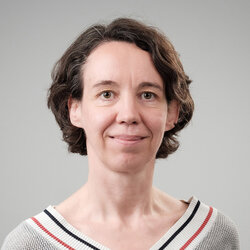Staff

Dr Katja Mielke
Professional Career
Katja studied at Freie Universität Berlin and Humboldt Universität zu Berlin and completed her PhD at the Center for Development Research (ZEF) of the University of Bonn in 2015. She has an interdisciplinary study background in social sciences. Her research, analyses and policy advice are empirically grounded, mostly qualitative in nature, and aim at mid-range theorizing. In her PhD dissertation, Katja analysed local politics around natural resources governance and the effects of the international intervention in rural northeast Afghanistan. In this context, she conceptualized ‘social order’ as framework to analyse Afghan rural politics from an emic perspective in a setting where ‘the state’ played a limited role. Contrasting the local social order with the ‘interventionists’’ ordering ideas showed why the military, political and development intervention measures enabled the international community, at best, to establish the image of a state in contrast to intended objectives of full-fledged institution- and statebuilding in post-2001 Afghanistan. At bicc, post-doc research on social mobilization and self-organization of communities in urban peripheries of Lahore, Karachi and Kabul carried the concept of social order/ing further while focussing on urban governance, class, and the nexus of spatial and social mobility. Projects on the phenomenon of Daesh in Afghanistan, transnational Kurdish actor networks, the conflict mitigation- and peace-making efforts of Afghans in exile, transnational (im)mobility patterns of Afghans in Pakistan, and migration governance in (northern) Iraq followed. Currently, Katja leads the project ‘China’s Belt and Road Initiative in Pakistan and North Rhine-Westphalia’ (2021-24). She has been appointed as expert to the Afghanistan Study Commission of the German parliament for the period 2022-24.
Publications
Policy Brief: Learning from Germany's Civil Engagement in Afghanistan
Deutsches Evaluierungsinstitut der Entwicklungszusammenarbeit (DEval) , Bonn (2024)
OpenPolicy Brief: Lernen aus dem zivilen Engagement in Afghanistan
Deutsches Evaluierungsinstitut der Entwicklungszusammenarbeit (DEval) , Bonn (2024)
OpenInter-ministerial strategic evaluation of Germany’s civilian engagement in Afghanistan
Deutsche Hochschule der Polizei (DHPol) , Münster (2023)
OpenRessortgemeinsame strategische Evaluierung des zivilen Engagements der Bundesregierung in Afghanistan
Deutsches Evaluierungsinstitut der Entwicklungszusammenarbeit (DEval) , Bonn (2023)
OpenOn Peace Activists and Skilled Survivors. Afghan Exiles and Transnational History-Making from Below
(2023)
OpenFinding One's Place in Chaos. Returnees' Reintegration Experiences in Northern Iraq
BICC , Bonn (2023)
OpenEndangered Urban Commons: Lahore’s Violent Heritage Management and Prospects for Reconciliation
(2023)
OpenAfghans’ narrowing mobility options in Pakistan and the right to transnational living: a figurational perspective
(2022)
OpenLooking beyond stereotypes: A critical reflection of popular narratives about the Taliban
(2022)
OpenOutward and upward mobility. How Afghan and Syrian refugees can use mobility to improve their prospects (TRAFIG Policy Brief No. 5)
BICC , Bonn (2021)
OpenNow more than ever: Afghans in Pakistan need more mobility and durable solutions to stay (TRAFIG Practice Note No. 7)
BICC , Bonn (2021)
OpenFigurations of Displacement in and beyond Pakistan. Empirical findings and reflections on protracted displacement and translocal connections of Afghans (TRAFIG Working Paper No. 7)
BICC , Bonn (2021)
OpenMitigating pro-poor housing failures: Access theory and the politics of urban governance
(2021)
OpenMeaningful political participation. Lessons learnt from UN mediation in Afghanistan and Syria
BICC , Bonn (2021)
OpenEngaging refugees and migrants as peace advocates. How Germany can contribute to peace in Syria and Afghanistan
BICC , Bonn (2021)
OpenMaking sure that the emigration of health-care personnel from Albania and BiH works for all: What Germany can do
BICC , Bonn (2020)
OpenReview of the book: The Taliban reader. War, Islam and politics, by A. Strick van Linschoten & F. Kuehn. Die Welt des Islams, 60(4), 493–496.
(2020)
OpenNow more than ever: Afghans in Pakistan need more mobility and durable solutions to stay (TRAFIG practice note 7). Bonn: BICC.
(2020)
OpenLearning from the Past. Protracted displacement in the post-World War II period (TRAFIG working paper 2).
(2020)
OpenBeyond Doha and Geneva: Peacemaking engagement of Afghans and Syrians in North Rhine-Westphalia and Germany
BICC , Bonn (2019)
OpenAbschlussbericht – Flucht- und Flüchtlingsforschung in Deutschland: Eine Bestandsaufnahme.
IMIS/BICC , Osnabrück (2019)
OpenCoping with protracted displacement - How Afghans secure their livelihood in Afghanistan, Iran and Pakistan
BICC , Bonn (2018)
OpenSituated sustainability: A research programme for conflict-affected settings and beyond
BICC , Bonn (2018)
OpenExodus aus Afghanistan: Wie Deutschland Selbsthilfe und Eigeninitiativen unterstützen kann
BICC , Bonn (2018)
OpenDrohende Gewalteskalation nach dem Referendum: Wie kann deutsche Einflussnahme in Kurdistan-Irak deeskalierend wirken?
BICC , Bonn (2017)
OpenJihadi-Salafism in Afghanistan—Beyond Taliban, Al-Qaeda and Daesh: Options for German foreign and development policy
BICC , Bonn (2017)
OpenFluchtursachen und internationale Verantwortung: Das Beispiel Afghanistan. Wissenschaft und Frieden, 35(2), 11-13.
(2017)
OpenThe role of area studies in theory production. A differentiation of mid-range concepts and the example of social order
Palgrave Macmillan , New York (2017)
OpenThe art of science policy for 21st century area studies: Concluding reflections
Palgrave Macmillan , New York (2017)
OpenIntroduction: Knowledge production, area studies and the mobility turn
Palgrave Macmillan , New York (2017)
OpenIslamischer Staat auch in Afghanistan? Aus der Perspektive der Forschung. Südasien, 37(1), 38-41.
(2017)
OpenProtected rather than protracted: Strengthening displaced persons in peace processes
BICC , Bonn (2015)
OpenDer Fall Kundus. Plädoyer für eine kritische Bestandsaufnahme. Wissenschaft und Frieden, 33(4), 36-37.
(2015)
Open(Re-)constructing Afghanistan? Rewriting rural Afghans’ Lebenswelten into recent development and state-making processes. An analysis of local governance and social order (PhD-Dissertation in Development Research)
Universität Bonn , Bonn (2015)
OpenDas neue Kabul: Besitzkämpfe und Interessen im Urbanisierungsprozess. Inamo, 20(78), 21-23.
(2014)
OpenWhat inhibits and enables Afghans' social mobility? On the limits of community organization and mobilization in Afghanistan
(2014)
OpenCrossroads studies: From spatial containers to interactions in differentiated spatialities (Crossroads Asia Working Paper series No. 15).
ZEF , Bonn (2014)
OpenErzwungene Staatlichkeit – Die internationale Intervention in Afghanistan
Johannes Gutenberg Universität Mainz , Mainz (2012)
OpenWater, war and reconstruction. Irrigation management in the Kunduz Region
Routledge , London (2010)
OpenPraktische Herausforderungen beim zivilen Wiederaufbau Afghanistans
Schöningh , Paderborn (2009)
Open

